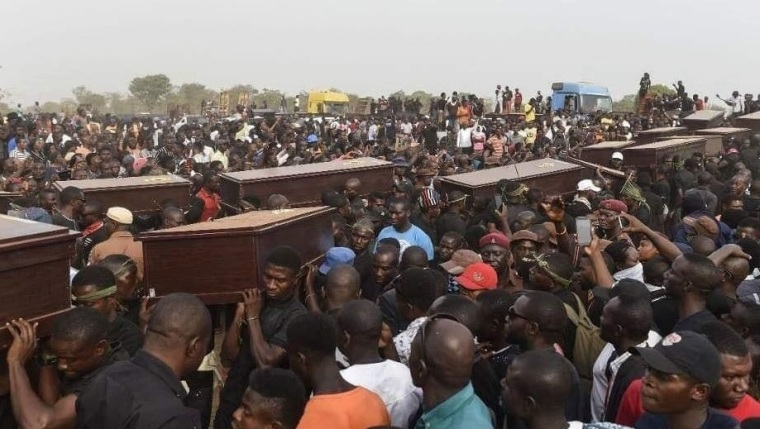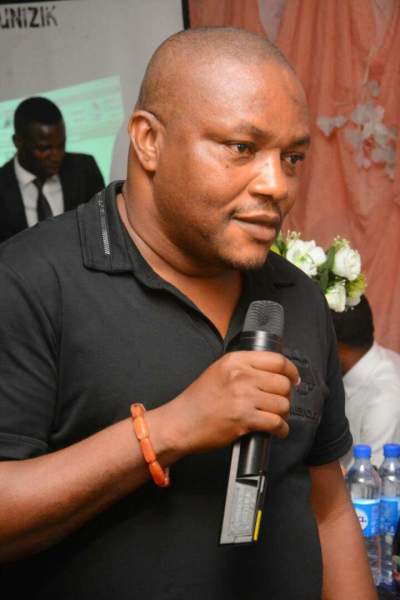Christians in Nigeria take part in funeral festivities in April 2019. | Intersociety April 1, 2020 | EASTERN PILOT A Nigerian civil ...

April 1, 2020 | EASTERN PILOT
A Nigerian civil society organization claims that no fewer than 350 Christians have been killed across the West African country since the start of 2020 and estimates that about 11,500 Christians have been killed since 2015.
A Nigerian civil society organization claims that no fewer than 350 Christians have been killed across the West African country since the start of 2020 and estimates that about 11,500 Christians have been killed since 2015.
“Nigeria has fully become a killing field of defenseless Christians,” the Anambra-based nongovernmental organization International Society for Civil Liberties and Rule of Law (Intersociety) said this week in a new special report, titled “Nigeria: A Killing Field Of Defenseless Christians.”
“Available statistics have shown that between 11,500 and 12,000 Christian deaths were recorded in the past 57 months or since June 2015 when the present central government of Nigeria came on board. Out of this figure, Jihadist Fulani herdsmen accounted for 7,400 Christian deaths, Boko Haram 4,000 and the ‘Highway Bandits’ 150-200.”
The organization, which is headed by Christian criminologist Emeka Umeagbalasi, has monitored violence against Christians in Nigeria since 2010 through a team of criminologists, lawyers, journalists, security, and peace and conflict studies graduates.

Nigeria has been marred by violence in the last decade-plus due to the rise of extremist organizations in the northeast like Boko Haram and its splinter group, the Islamic State’s West Africa Province.
In recent years, massacres carried out by radicalized Fulani herders against predominantly Christian farming villages in Nigeria’s Middle Belt have also driven communities from their homes.
Additionally, bandit gangs have been responsible for carrying out kidnappings along some major highways.
The United Nations estimates that about 2 million people have been internally displaced across Nigeria and 11 million people in need of assistance. An additional 550,000 are said to be displaced in neighboring countries of Cameroon, Chad and Niger.
“While 100 percent of the victims of Jihadist Herdsmen attacks across Nigeria are Christians, the estimated 4,000 Christians killed by Boko Haram were part of the estimated 6,000 [people in total] massacred by the sect since June 2015,” the report explains.
“Generally, many, if not most of the victims of Boko Haram/ISWAP attacks in Nigeria’s Northeast are Christians. On the part of ‘Bandits/Highway Kidnappers’ in Northern Nigeria, most of their rural victims are Muslims while many, if not most, of their roadside victims are Christians traveling to northern or southern parts of the country using the Birnin-Gwari Federal Road, near Kaduna, etc.”
For its monitoring and documentation, Intersociety relies on what it deems to be credible local and foreign media reports, government accounts, international rights groups, eyewitness accounts and reports from various Christian bodies in the country.
Intersociety reports that Fulani herdsmen accounted for 250 of the 350 deaths recorded in January and February 2020 while Boko Haram and highway bandit gangs are responsible for 100 deaths.
In the past two months, Intersociety reports that radical Fulani militants have carried out attacks in Nasarawa, Adamawa and Edo in addition to some other locations throughout the country.
Last year, Intersociety reported that no fewer than 2,400 Christians were killed by Fulani radicals in 2018. In 2019, according to the group, between 1,000 to 1,200 Christians were killed by Fulani attackers.
While reports have indicated an increase in deadly Boko Haram attacks beginning in December 2019, Intersociety noted that Boko Haram attacks targeting Christians since January 2020 intensified in Borno, Adamawa and Taraba States.
“[The attacks are] claiming between 50 and 70 Christian lives and loss of churches and other buildings belonging to Christians,” the report explains, adding that Boko Haram was responsible for killing at least 1,000 citizens in 2019.
Additionally, between 100 and 150 Christian travelers were said to have been abducted on highways since the beginning of the year.
“The killings targeted at Christians in Nigeria have continued into the first week of March 2020 leading to hacking to death of over a dozen more,” the report reads. “Among the worst hit in the latest round of Jihadist Fulani Herdsmen attacks are Plateau State with 70-80 deaths, Kaduna [with] 50 deaths, Kogi [with] 30 deaths, Benue [with] 15-20, Delta [with] 16 and Taraba [with] 10.”
In the past 57 months, no fewer than 20 clergymen (including eight Catholic priests and seminarians) have been hacked to death, while no less than 50 were abducted or kidnapped, Intersociety reported.
Earlier this year, Boko Haram kidnapped and then executed the Rev. Lawan Andimi, chairman of the Christian Association of Nigeria’s chapter in the Michika Local Government Area of Adamawa state.
Other slain religious leaders killed in Nigeria in the past 12 months include the Revs. Clement Ugwu and Paul Offu.
Intersociety also estimated that over 2,000 churches and Christian worship centers have been burned since June 2015, with Fulani herdsmen being responsible for about 1,500 and Boko Haram accounting for 500.
Churches in Benue, Plateau and southern Kaduna states were among the most targeted by Fulani radicals.
“In eight years, between 2011 and 2019, Benue State had lost 600 churches and other Christian worship centers to Jihadist Fulani Herdsmen," the report states.
Intersociety’s claim that most of the people killed by Boko Haram are Christian contradicts data given out by Nigeria President Muhammadu Buhari in early February.
In an op-ed, Buhari stated that “90 percent of all Boko Haram’s victims have been Muslims.” Buhari claimed that the “now-failing terrorists have targeted the vulnerable, the religious, the non-religious, the young and the old without discrimination.”
However, weeks later, a member of the Nigerian government, Minister of Information Alhaji Lai Mohammed, acknowledged that terrorists are focusing their attacks on Christians, noting that in the past, that was not the case.
"They have started targeting Christians and Christian villages for a specific reason, which is to trigger a religious war and throw the nation into chaos," he said while distancing the perpetrators from Muslims and noting that Muslims have also been victimized.
Death toll statistics in Nigeria can vary depending on which organization is providing them because of the lack of adequate government record-keeping, International Committee on Nigeria co-founder Stephen Enada previously told The Christian Post.
Enada, who fled to the United States in 2016 after his cousin was killed by Fulani radicals, believes that reported death tolls should be construed as nothing more than estimations.
“When you talk about data mining statistics, Nigeria doesn’t even have a national data record to even say [what is] our population,” Enada explained at the time. “So sometimes, if somebody is killed, you don’t even have a way to trace a person to his family outside his community because we don’t have data.”
“Because we don’t have such data, it is very complicated. Sometimes, when people are killed, they will just do a mass burial where there is no autopsy, post mortem, no record. If you go to these communities, you will see that they don’t have any record for the people who died. That is what we are working with.”
Last November, the U.K.-based NGO Humanitarian Aid Relief Trust estimated after a fact-finding mission that at least 1,000 Christians were killed in Nigeria from January 2019 until November 2019.
HART, founded by Parliament member Baroness Caroline Cox, estimated that at least 6,000 Christians were killed since 2015.
A HART spokesperson clarified to CP that the 1,000-deaths estimation counts “predominantly people killed in Plateau, Southern Kaduna and Taraba states by Fulani Herdsmen” but also includes some killings by Boko Haram in Borno state.
The HART spokesperson added that the estimation was partly based on reports from the Kaduna state government and reports from the Plateau state. HART's estimations also include Boko Haram’s killing of security officers and soldiers believed to be Christians.










No comments